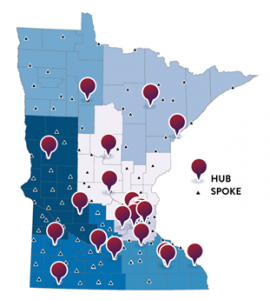12-8 COVID-19 Update: Minnesota Projected to Get 183,400 Vaccine Doses by Year’s End
MN COVID-19 Update: Governor Walz Announces Minnesota’s Vaccine Plan
On Tuesday, Dec. 8, Governor Tim Walz joined the Minnesota Department of Health (MDH) on to discuss Minnesota’s COVID-19 vaccine distribution plan. You can watch the full briefing here.
Governor Tim Walz:
- “Minnesota’s plan is solid,” noting a bipartisan group has been working on this plan for months.
- “You need to feel comfortable around the safety of the vaccine.”
- “Operation Warp Speed” didn’t speed up clinical trials, said Walz, it was sped up on the manufacturing logistics with the federal government footing the bill if what gets manufactured isn’t proven effective. Walz complemented the Trump Administration after the briefing on this effort.
- “A lot of states are trying to catch up to where we’re at,” Walz said.
- “We’ve done this,” noting the influenza vaccine process. “We’re ready.”
- “There’s no mandate for you to take the vaccine,” Walz noted.
- State committee made recommendations based on federal framework.
- There will be a limited initial supply, noting it’s not just Minnesota looking for the vaccine, it’s the entire world.
- “We’re at the worst part of the worst part of this pandemic,” as deaths in U.S. have soared to more than 2,200 a day on average.
- Masking and social distancing still needs to be done to get to the finish line, said Walz.
- Pfizer Vaccine gets stored at 90 degrees below zero, presenting some logistical challenges.
- Vaccine shipped with dry ice.
- Between now and end of year, Minnesota expecting 183,400 doses of vaccine (unconfirmed tally, Walz notes). 5.695 million people in Minnesota.
- 46,800 doses of vaccine from Pfizer expected next week in Minnesota
- Moderna vaccine expected to be brought online a week after Pfizer.
- Walz: Moderna expected to be better stored and used for Greater Minnesota, with Pfizer vaccine, which needs ultra cold storage, for urban areas.
MDH Commissioner Jan Malcolm:
- “This is a good day,” said Malcolm. “It’s been a long year and there hasn’t been a lot of good news.”
- “This is really an unprecedented effort,” said Malcolm. “The scale of this has not been done before.”
- No vaccine is approved yet in the U.S., though the FDA could approve Pfizer’s vaccine as early as the end of the week (Decision expected Thursday, Dec. 10). Moderna approval set for one week later (Dec. 17).
- Vaccine distribution will be a three-phased approach according to CDC’s approved framework. Malcolm has previously mentioned that the state must follow this framework.
- Phase 1A: State health care workers and those in long-term care facilities will be vaccinated
- These will employer-based vaccinations
- Phase 1A health care workers include workers in hospitals caring for COVID patients, long-term care facilities, EMS personnel and COVID testers.
- Phase 1A long-term care facilities include skilled nursing homes and veterans’ homes.
- Second priority group of Phase 1A includes any hospital worker providing any direct patient care. Will also include workers in urgent care settings and dialysis centers. Assisted living residents included in second priority group.
- Third priority group of Phase 1A includes all remaining health care personnel who are not able to telework, including dental offices. Adults with intellectual disabilities living in congregate care settings part of this group as well.
- Phase 1B: MDH expects first responders, including police officers and firefighters, education sector. (Advisory Committee on Immunization Practices or ACIP, a federal scientific panel, providing recommendations). Phase 1B and later phases not fully approved yet.
- Phase 1C: MDH expects people who are most at risk for serious complications from the virus and adults 65+.
- Phase 2: More settings will get vaccine during Phase 2, when a larger number of doses become available. Unclear yet when Phase 2 will begin.
- Phase 3: The general population.
- Phase 1A: State health care workers and those in long-term care facilities will be vaccinated
- “We are absolutely committed to getting the vaccine to every Minnesotan,” said Malcolm.

25 “hub” sites set up to directly receive vaccine deliveries through national vaccine distribution chain.
MDH Infectious Disease Director Kris Ehresmann:
- Other vaccines besides Pfizer and Moderna will also be coming online in the coming months (Johnson & Johnson – expected to be one-dose vaccine, AstraZeneca, etc).
- Both vaccines have had to meet “strict, safety guidance.”
- It takes two doses of vaccine for the Pfizer and Moderna vaccines (roughly about a month between the two doses).
- Have to stay consistent with manufacture. (i.e. if you get Pfizer vaccine, second dose must be Pfizer vaccine)
- It will take about six weeks to have protection from COVID (the full process – first dose, second dose, immunity buildup)
- Vaccines in clinical trials showed 95% efficacy for Pfizer and Moderna, which Ehresmann has previously stated, is extremely good.
- Vaccines will first go to adults, then kids.
- Trials still taking place to prove safety for children.
- Vaccinating front-line health care workers will help reduce need for business and activity restrictions currently in place.
- A social vulnerability index in place with distribution to help more vulnerable people based on socioeconomic factors.
- Anticipates week of Dec. 21 to begin administering vaccine
- Says people who have had COVID will still need to get the vaccine, but recommends others who haven’t gotten vaccine to get it first.
Dr. Jill Amsberry, serves on state’s vaccine allocation work group
- Recommended vaccine be distributed “as fairly as possible with health equity in mind.”
COVID-19 Latest:
- In Minnesota, 359,203 total confirmed cases (up 3,080 over previous reporting day)
- The 3,080 cases is one of the lowest daily totals in several weeks.
- Of the 359,203 cases, 314,957 (88%) are no longer considered infectious
- In Minnesota, 4,027 total deaths (up 22 over previous reporting day)
- Of the 22 new deaths, 15 were residents of long-term care/assisted living facilities.
Q&A and Notes:
- A bipartisan group of legislators took part in the vaccine planning.
- Speaker Melissa Hortman, DFL-Brooklyn Park: “The vaccine distribution is not a political issue”
- Senate Majority Leader Paul Gazelka, R-Nisswa: “I’m encouraged there’s something we can agree on.”
- House Minority Leader Kurt Daudt, R-Crown, “I have complete confidence in the vaccine.”
- Hortman on financial aid for businesses: “The level of need our businesses have,” can only be meet by federal government.
Brooklyn Center | Brooklyn Park | Champlin | Crystal | Golden Valley | Maple Grove | New Hope | Osseo | Plymouth | Robbinsdale | Rogers | Twin Cities | Wayzata



